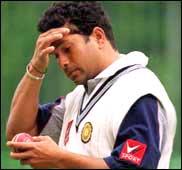Time for honesty
Daniel Laidlaw
If there can be anything positive to emerge from the controversy generated
by match referee Mike Denness's punishments handed down to six Indian
cricketers, it is that it might finally bring the issue of biased
officiating to a head. It has been simmering away in the background for a
long time now and while itís doubtful it will be satisfactorily resolved,
it might at least bring to the entire cricket worldís attention the need for
a review of how and why India has been victimised by match referees.
Until now, I donít believe the cricket world has had much of an idea of
how India has seen its treatment by match referees. In fact, the reaction to
these latest punishments will probably be seen as hysterical without an
 appreciation of what has happened in the past. Many probably won't realise
that the outpouring of emotion is not truly a reaction to the latest case
alone but is actually the culmination of feeling over many instances of
unfair treatment.
appreciation of what has happened in the past. Many probably won't realise
that the outpouring of emotion is not truly a reaction to the latest case
alone but is actually the culmination of feeling over many instances of
unfair treatment.
The reason I say that is because until starting to follow Indian cricket
around three years ago, I had no idea how Indians felt about their cricket
teamís treatment from umpires and match referees and was indeed very
sceptical about it. Essentially, when a decision or official judgement
does
not concern your own team, you digest it with detached interest and then
quickly forget about it. Then when the next incident comes along, you
again
see it in isolation as being unfortunate, unlucky or inconsistent, while
not
drawing a relation between the two.
It is not until you begin to follow the situation more closely, and are
made
aware of a history of dubious and discriminatory sentences, that you start
to realise the Indian media and supporters might have a point. Itís
distasteful, because in some way you canít help but feel it reflects upon
you and your own point of view, but eventually I have come to realise that
India is so consistently victimised by officialdom that a conclusion of
bias
becomes an uncomfortable truth. In cases too numerous to mention, the
evidence is there. The actions of Mike Denness are just the final proof.
Hopefully, Denness's sentences are so shocking that they will cause an
official review of the way punishments have been handed out for some
offences and not others. The overhaul of the match referee panel is
already
on the way; hopefully there will now be an honest assessment of how and
why
some referees performed the way they did so there will be no lingering
bitterness and mistrust carried over to the future. It is time for
honesty.
There is almost no need to refute and expose the hypocrisy of Denness's charges because it's so obvious to all. The charge of ball tampering
against
Sachin Tendulkar is perhaps the most emotive and controversial. Tendulkar
is
the world's highest profile cricketer and he knows that every time he
takes
the field he is under the most intense scrutiny imaginable. For him to
intentionally tamper with the ball on the way back to his bowling mark
with
the intention to cheat, when the camera is often in a tight close-up of
the
bowler, would be so incredibly stupid that it is an insult to his
intelligence to take it any further than a warning to be careful what he
does with his fingernails.
Like many others, I saw the alleged ball tampering incident on television at the
time, the commentator made passing reference to cleaning the dirt out of
the seam, and that was that. It was not as if Tendulkar was attempting to lift
the seam or alter the shape of the ball. He wasnít even working at it
vigorously. Surely on the basis of evidence and Tendulkarís impeccable
record, the incident should not have gone any further than a meeting, if
it warranted any attention at all.
The method by which Tendulkar and the Indians were reported is also an
apparent breach of procedure, if it is true that the South African television company which produces the coverage first notified Denness of any of the
offences to which he subsequently took action. The truth of that may never
be known.
 Of greatest concern, though, is the prejudiced way in which Denness
elected
to enforce the ICCís crackdown on sledging and dissent. Last month, ICC
Chief Executive Malcolm Speed said in a press release that the ICC were
aiming to increase penalties for on-field misbehaviour. So how was it
possible for Denness, in good conscience, to punish the incidences of
dissent while ignoring the apparent sledging by Pollock and Kallis?
Of greatest concern, though, is the prejudiced way in which Denness
elected
to enforce the ICCís crackdown on sledging and dissent. Last month, ICC
Chief Executive Malcolm Speed said in a press release that the ICC were
aiming to increase penalties for on-field misbehaviour. So how was it
possible for Denness, in good conscience, to punish the incidences of
dissent while ignoring the apparent sledging by Pollock and Kallis?
Assuming
sledging entails speaking disparagingly towards the batsman, which most
agree it does, Pollock and Kallis were both guilty of it in the second
Test. Whether or not they actually used profanity is moot. Like dissent, the
image
it projects is the same. Can Dennis have only received one half of the
ICCís
get-tough directive to match referees?
The laws themselves have been used in a ridiculously arbitrary fashion
that,
if applied fairly under the guidelines in which Denness used them, would
result in widespread suspensions. If Code No. 4 was applied to all as it
was
to Virender Sehwag, half the South African and Australian teams would be
suspended and undoubtedly a lot of other cricketers as well. The ICC must
ensure its laws are applied fairly to all nations, white, Asian or
whatever,
or else the game will be torn apart.
A latent but essential aspect of the controversy is the larger issue of
how different nations view similar breaches of the code of conduct. Itís a
fact that cricket people in Australia and South Africa generally see
"gamesmanship", or sledging, as an acceptable or at least tolerable part
of a highly competitive sport, while finding excessive appealing and other
antics not generally adopted by their players irksome and against the
spirit of the game. It is a cultural thing and, yes, incredibly hypocritical. The
feeling is that "the way we play the game is fine, if you donít like it
thatís your problem", while at the same time finding the conduct of other
sides worthy of punishment.
No one will admit it but it is also true that sledging or dissent
committed by an Indian player is harder to accept than when it is committed by an
Australian or a South African, from whom it is expected and tolerated. As
an Australian, I know that until recently, seeing McGrath or Kallis sledge a
batsman did not make me pay any particular attention, while I did take
extra notice when an Indian player prolonged an appeal or showed signs of
dissent, either because I was not used to it or possibly prejudiced in some small
way. You can bet any hint of misconduct from an Indian player attracts
greater attention from match referees, too.
Now, that is a natural reaction and not necessarily bigoted. However, if
match referees canít recognise WHY they are only taking notice of
comparatively rare and minor misconduct by Indian players, and then donít
ensure that other players are punished equally for their offences then, if
not truly racist in the worst sense of the word, it is certainly
discriminatory.
That should not be so difficult to do. If it is, then they are unfit for
their jobs. The first requirement for a match referee should be
impartiality, and while no-one can truly be neutral, it should not be hard
to apply the rules fairly. So much that occurs in cricket is open to
interpretation, which is why it's so fun to write about it, but if Sehwag
and co are guilty of dissent, then Pollock and Kallis are guilty of
sledging. There is just no room to rationalise otherwise. To ignore one
and
not the other is indeed biased.
For me, the worst part of this episode is that it can only harm relations
between the world cricket community, and that is really sad.
More Columns
Mail Daniel Laidlaw